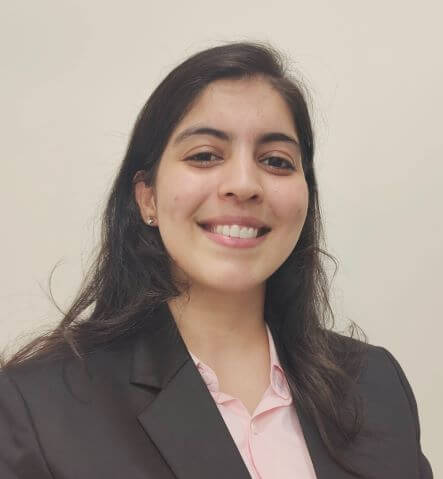The positives of joining business school in India are numerous: you gain invaluable skills, a network of contacts, strengthened career prospects – as well as a class of smart peers, professors with high expectations, and rigorous courses. But if you're thinking of applying, you may wonder what your life will be like at business school in India.
To find out, BusinessBecause spoke to two current students at BITS School of Management (BITSoM), a new business school in Mumbai.
Starting an MBA at a new business school in India
India is an increasingly popular destination for business school students, especially for in-country applicants. The proportion of MBA aspirants in India preferring to study domestically rose from 18% to 28% between 2019 and 2021, according to a survey conducted by the Graduate Management Admission Council (GMAC).
Khushboo Lakhwani and Srikar Chintalagiri are two such students and are in the first two classes at BITSoM, which was founded in 2021 within the Birla Institute of Technology and Science (BITS).
BITSoM's two-year MBA program values experiential learning methods. The MBA takes a holistic approach to its academics, with a curriculum driven by global experts from across industries and academia.
For Indian candidates deciding whether to study in-country or abroad, BITSoM offers access to a range of faculty from top business schools worldwide while studying in Mumbai. Professors hail from prestigious institutions such as Kellogg School of Management, Singapore Management University, Cornell Johnson Graduate School of Management, and Oxford Saïd Business School.
A day as a first-year student at an Indian business school
In June 2022, Khushboo(pictured) started an MBA at the Indian business school, BITSoM, with the intention of enhancing her business acumen and knowledge of strategy.

A typical day for Khushboo revolves around her core business classes and Winning at the Workplace classes (WaW).
BITSoM's core classes emphasize the hard skills typically associated with business, such as management and finance. While the WaW classes focus on the holistic side of running a business, providing students with an understanding of soft skills and the personal side of leading a company and its employees.
BITSoM arranges its curriculum into blocks so that students can focus on one ‘hard skill’ subject and one ‘soft skill’ subject. Students then take a test before moving on to the next block.
Khushboo’s day starts with a three-hour core class on Consumer Insights, taught by Rajagopal Raghunathan from the University of Texas at Austin, McCombs School of Business. This class often involves practical elements, such as activities that analyze consumer choices.
"We had to pick a city where we wanted to live after our MBA. We wanted to understand how consumers make choices. So, we were analyzing how people around us make choices. And then we drew data from that,” she says.
Khushboo's hour-and-a-half WaW class happens after lunch and is on whole brain thinking. Here she learns how to make decisions using lateral thinking methods, rather than purely analytical processes.
"I'm into consulting, and I think very analytically. But whole brain thinking taught us that creativity should be a part of it. And that if you bring lateral thinking to the table, you stand out," Khushboo explains.
Throughout her typical days, Khushboo is also readying her group assignments with a diverse cohort of varying backgrounds, from those with four years in finance to recent liberal arts grads.
She's also preparing for the summer internship she landed at the Boston Consulting Group (BCG), working with the career advisors at BITSoM to identify her strengths and weaknesses as a business manager.
A day as a second-year student at an Indian business school
As a second-year MBA student, Srikar (pictured) has a busy schedule. Like Khushboo, he starts his day at nine with a three-hour core business class. In his current block, he is taking a course in Pricing and Revenue. Srikar’s previous core classes include Operations Management, Marketing, Finance, and Supply Chain Management.
Srikar says that the professor of the Pricing and Revenue course, Andrew Gershoff, is a highlight of the class.
"He's always open to questions. And if we don't understand it, he goes back to the basics. He ensures people understand the pricing and the different consumer behaviors that go into pricing and revenue optimization."
After his core course, Srikar has 30 minutes for lunch before the 1.5-hour WaW course in Sociology. In this class, he learns about different philosophies, such as Marxism, and how these concepts affect social structures, social constructs, and gender equality.
"First, we discussed how gender has played a role across societies in a temporal and geographical sense. Then we see how gender plays into businesses in India, the UK, France, Japan, Africa, and China," he says.
So far, WaW courses have been a highlight of Srikar's MBA journey. He recalls the Expression Through Theatre class, which taught Srikar the importance of public speaking and stage presence.
"As Shakespeare says, 'all the world’s a stage.'"
After his WaW course, he goes to office hours with professors to discuss assignments, final projects, and exams. He has a little free time after that before he comes back to campus for assignments and national business competitions.
BITSoM students can compete in an array of competitions hosted by corporates and other business schools—Srikar recently participated in the Crack the Case competition.
"A startup in the insurance sector conducted it. They gave us a particular problem set, and we had to devise a solution," he says.
Srikar says that the impressive faculty at the business school in India have elevated his study. Gad Allon from Wharton taught him Scaling Ventures, Dan Gode from NYU Stern taught Business Drivers, and Raj Upadhyay taught poems like Invictus and India's epic poem Ramayana in the WaW course in World Literature.
Both Srikar and Khushboo believe that BITSoM's holistic approach to business education distinguishes it from other business schools in India, preparing them to be effective not just as business managers, but also as inspiring, supportive leaders.
"You need responsible leaders in business today. The idea behind BITSoM was to create those responsible leaders, so when these future leaders make a business decision, they will not just think about that bottom line, but they can think much deeper about how it's affecting the society and the planet," Srikar says.
Next Read:
How To Prepare For An Interview To Business School In India
Learn more:



